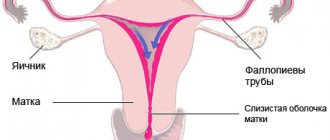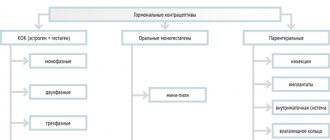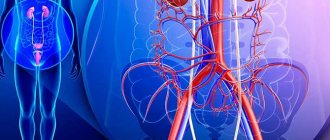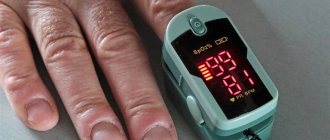Forty-five years is considered a transitional stage in a woman’s life: the time comes when the body begins to prepare for menopause, which is reflected in the hormonal background and entails various symptoms. Menopause is not only the cessation of menstruation, the appearance of hot flashes and the inability to get pregnant. A woman’s hormonal system begins to work in a different mode, and this happens a year or two before the cessation of menstruation. The onset of premenopause is indicated by a routine hormone test, which a woman can take at any center. The “Formula Health” gynecological clinic carries out hormone tests and gives accurate results.
Menopause and menopause are not the same thing!
Menopause is caused by depletion of the supply of eggs in the ovaries and, accordingly, a decrease in the activity of the reproductive system. During menopause, the production of many female sex hormones decreases, which affects the nature of menstruation, the body switches to a new mode of life, “gets used” to a different hormonal balance. The restructuring occurs gradually and stretches over 7-10 years. Therefore, menopause is divided into several periods:
- Perimenopause.
- Menopause.
- Postmenopause.
Menopause is the time when menstruation does not occur for 12 months. However, menopause itself begins 2-4 years before. One of the signs of perimenopause, that is, the first stage of menopause, is a change in the cycle.
Why do you need to know these values?
To prepare for menopause. In addition to prescribing replacement therapy, a woman should introduce calcium-containing foods into her diet: cottage cheese, fermented milk products, cheese to prevent osteoporosis. You need to undergo a gynecological examination: take a smear for oncocytology, do an ultrasound of the pelvic organs and mammography. You should donate blood for sugar and cholesterol levels. Adjust your diet, move more, follow a sleep and rest schedule. Your doctor may prescribe vitamins or supplements to relieve menopausal symptoms.
Obstetrician-gynecologist of the highest category. Chernovskaya Rosa Uranovna
How menstruation behaves before menopause
At about 40 years old, a woman enters the so-called late reproductive period. It is characterized by the preservation of ovulation and cycle regularity. But due to the fact that the number of eggs in the ovaries becomes smaller, the hormonal balance begins to slowly change. The level of estrogen remains normal, but the level of progesterone decreases slightly, due to which the follicular phase is shortened. This leads to the fact that before menopause, menstruation occurs earlier than usual, the cycle is shortened by several days. At this time, a woman may well become a mother if she has a desire.
To consider the period of female menopause, you need to understand the terminology:
* Female menopause, the transition to menopause - for a long time was called premenopause, that is, the period from 45 years to menopause; * female menopause, menopause - the last independent menstruation (the date of menstruation is set retrospectively, after 12 months of its absence); * female menopause, premenopause - the period from the appearance of the first menopausal symptoms, changes in the menstrual cycle, symptoms of estrogen deficiency, up to 2 years after the last menstruation; * female menopause, postmenopause - begins with menopause and ends at 65-69 years; * female menopause, artificial menopause - caused by the cessation of ovarian function due to surgery, the use of cytostatic, radioactive or other substances; * female menopause, post-variectomy syndrome - a set of symptoms that develop after removal of the ovaries, regardless of the presence of the uterus, is one of the options for artificial menopause; * female menopause, premature menopause - menopause that occurs before the age of 40; * female menopause, menopause - includes premenopause, menopause and the following 5-6 years of postmenopause.
The average age of menopause is 51.3 years; with early menopause, the cessation of menstruation is observed at 40-44 years; with premature menopause - at 36-39 years. Approximately 50% of women experience menopause between the ages of 45 and 50; in 25% - after 50 years; 25% are under 45 years of age.
- Early menopause, examinations for menopause, treatment of menopause, symptoms and signs of menopause
- Menopause and menopausal syndrome
- By what signs can a woman determine menopause and menopausal syndrome?
- What symptoms of menopause should you consult a doctor for?
- Climax. Menopause - Treatment of menopause: HRT, folk remedies
Menstruation during menopause
The very first and, perhaps, most accurate sign of the onset of menopause is an increase in the cycle. If during the reproductive period the normal cycle lasts 25-35 days, then during menopause menstruation occurs in 45-50 days. Many cycles go by without ovulation. The nature of the discharge often changes - it can become either more scarce or more abundant. This period is called perimenopause. It lasts approximately 4 years.
Over time, the cycle loses regularity and it becomes more and more difficult to calculate it. This means that the supply of eggs is almost completely depleted, and menopause will soon occur. Before menopause, menstruation may be absent for 3-4 months.
At this time, other symptoms of menopause appear occasionally: attacks of insomnia, unexpected feeling of heat without a real increase in temperature, sweating, sudden fatigue, increased fatigue. The emotional state at the beginning of menopause may resemble premenstrual syndrome, but without connection with the approaching menstruation. During this period, it makes sense to take phytoestrogens and B vitamins, for example, as part of the Mense complex - they will help smooth out these symptoms, improve well-being and general condition.
How to take a hormone test correctly?
Blood tests are taken on certain days of the cycle - the day of the test will be calculated by the doctor. So tests for FSH and LH are taken at the beginning of the cycle - on days 4-5. Analysis for estradiol - 19-22 days. Progesterone test at the same time. There are a number of restrictions before donating blood for hormones; they must be observed, otherwise the result will be distorted. Avoid alcohol and physical activity a week before the test. Do not have sex the day before the test day. Take the test strictly on an empty stomach - in the morning, the break from the last meal should be at least 8 hours. You can drink water. Do not take medications.
What technologies are used at HARMONY to cure pathological menopause?
In our medical center, treatment of symptoms and manifestations of pathological menopause is carried out using the latest laser device Mona Lisa Touch from Deka (Italy). This laser is specially designed for gynecological applications and uses a unique patented CO2 technology.
The Mona Lisa Touch laser has no analogues in Belarus. This is the only device that has undergone clinical studies, proving its effectiveness and safety when working on mucous membranes.
Using the Deka Mona Lisa Touch laser, symptoms of menopause can be eliminated, such as: ● Vaginal dryness. ● Involuntary loss of urine. ● Prolapse (loss) of the genitourinary system organs ● Atrophic vulvovaginitis. ● Sexual dysfunction. ● Various inflammatory processes of the genitourinary area.
The use of the Mona Lisa Touch laser in gynecology is absolutely painless for patients.
Mona Lisa Touch gives excellent results in treating the symptoms of pathological menopause after the first procedure. It has no side effects, improves the effect of medications, and its safety for patients has been confirmed by numerous international studies.
The use of laser in the treatment of menopause symptoms allows you to get a quick, excellent effect! The action of the laser is aimed at enhancing the production of new collagen, improving blood circulation and tissue nutrition. The muscles acquire tone and elasticity, the woman’s genitals regain beauty and youth.
Menopausal syndrome, symptoms
During menopause, a woman may experience a number of unpleasant sensations. Symptoms can vary in intensity and be present in different combinations. They are divided into several groups.
Neurovegetative symptoms:
- tides;
- sweating;
- changes in blood pressure;
- chilling;
- nausea, abdominal pain;
- dizziness, headaches;
- heartache;
- palpitations.
Metabolic-endocrine symptoms:
- swelling, weight gain;
- engorgement of the mammary glands, mastopathy;
- flatulence;
- vaginal dryness, spotting, bleeding;
- skin atrophy, itching;
- urinary incontinence, painful urination;
- pain in bones and joints;
- increased blood cholesterol levels.
Psycho-emotional symptoms:
- irritability;
- decreased libido;
- sudden mood changes;
- tearfulness;
- aggressiveness;
- anxiety;
- depression, apathy;
- forgetfulness, deterioration of concentration;
- insomnia;
- inexplicable sensations (tingling, goosebumps, etc.).
What does HARMONY offer for the treatment of menopause?
HARMONY Medical Center offers a full range of services for the diagnosis and treatment of menopause in women. Our gynecologist-endocrinologists will gently and delicately conduct a gynecological examination in a chair and, based on their many years of experience, make the correct diagnosis.
Our arsenal includes expert-class ultrasound machines with high resolution accuracy. In our own PCR laboratory, a laboratory doctor will perform the necessary tests - gynecological smears, oncocytology analysis, sex hormone analysis and analysis of vaginal microflora (Femoflor study to exclude pathogenic conditions of the flora). You can be calm and confident that you will receive the full range of necessary services in one place in the shortest possible time.
To treat menopause, our doctors will offer gentle treatment that is suitable for you.
How to stop bleeding
The beginning of any treatment should occur under the supervision of a physician. Even if you subsequently reduce the amount of menstruation using folk remedies, you need to start with a normal examination and diagnosis. It is more important for you to determine the real cause of the bleeding and begin to treat it, rather than try to cope with heavy menstruation without understanding why it started.
Some of the diseases that cause heavy periods are treated with pills or injections. Others may require surgery to treat.
Cold compresses will help reduce bleeding
If you suddenly experience heavy bleeding from the vagina or uterus, you should call an ambulance as soon as possible, and while it is on the way, do the following:
- lie on your back and place your legs above your head to reduce blood flow to the abdominal area;
- apply cool compresses to the skin in the abdomen (put ice or frozen food in a towel, apply the towel to your abdomen for 10 minutes, then take a five-minute break);
- drink water to prevent dehydration;
- You can drink water with honey and lemon, as they are believed to have hemostatic properties.
Medicines
Several drugs are used to treat major bleeding. They differ in their effects and effects on the body, so they must be prescribed by a doctor.
- Oral contraceptives. Some women doubt whether these drugs can stop bleeding. After all, they do not belong to the group of hemostatic tablets. But since almost all oral contraceptives are hormonal, in some situations they are quite capable of coping with the task.
- Duphaston. Hormonal pills that help stop bleeding. The advantages include the fact that Duphaston does not affect blood clotting in any way.
- Dicynone. A homeostatic drug that increases blood clotting and thereby reduces blood loss.
- Vikasol. It is an artificially created vitamin K, it affects blood clotting, due to which it stops blood loss.
- Transekam. It comes in the form of tablets or injections. Belongs to the group of hemostatics, it helps stop bleeding well.
- Aminocaproic acid. Increases blood clotting by dissolving blood clots and clots.
The attending physician will select a drug for the treatment of heavy menstruation
Most of the prescribed drugs affect blood clotting, so you should not start using them without a doctor’s prescription. After all, if you have any diseases associated with the circulatory system, then you can worsen your condition. And most women over the age of 50 have venous dilation.










